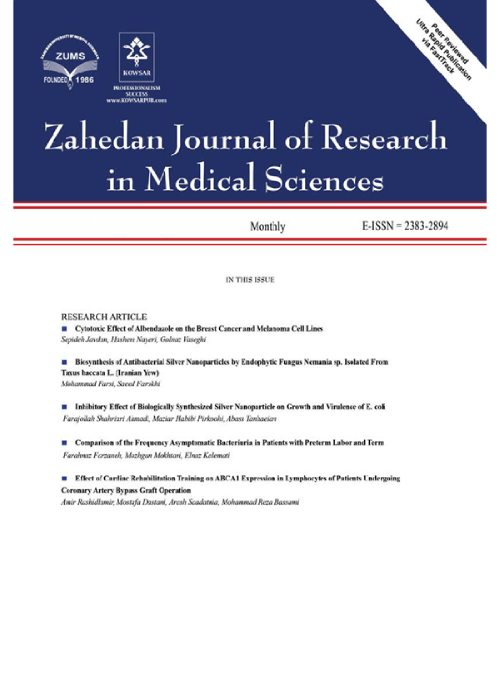Effect of Salvia chorassanica Root Aqueous, Ethanolic and Hydro Alcoholic Extracts on Staphylococcus aureus, Enterococcus faecalis, Salmonella typhimurium and Escherichia coli
Author(s):
Abstract:
Background
Nowadays, through the previous researches, it has become clear that Salvia has important health benefits. Salvia chorassanica is one of the valuable native Iranian species which only grows in Khorasan province, Iran.Objectives
The aim of this study is to evaluate the antimicrobial effect of Salvia chorassanica root aqueous, ethanolic and hydro alcoholic extracts on Staphylococcus aureus, Enterococcus faecalis, Salmonella typhimurium and Escherichia coli.Methods
In this experimental study, maceration method was used to prepare extracts. Study setup was conducted in March 2014.The duration of study setup took for two months. The micro dilution method by ELISA was used to determine the minimum inhibitory concentration (MIC) and minimum bactericidal concentration (MBC) of aqueous, ethanolic and hydro alcoholic extracts of root of Salvia chorassanica against Staphylococcus aureus, Enterococcus faecalis, Salmonella typhimurium and Escherichia coli. The antibacterial effect also was evaluated using agar diffusion method. The inhibition zones of growth against the extracts were measured in comparison to standards antibiotics. Chloramphenicol as positive control on Enterococcus faecalis, Tetracycline on Staphylococcus aureus, Gentamicin on Escherichia coli and Neomycin on Salmonella typhimurium. The data were analyzed using one way analysis of variance (ANOVA) with SPSS version 16.Results
The highest inhibition zone in diffusion method was related to ethanolic extract of Salvia chorassanica root against Gram-positive bacteria, Staphylococcus aureus and Enterococcus faecalis. The calculated MIC in aqueous and ethanolic extracts of root for Staphylococcus aureus was 240 and 120 mg/mL, for Enterococcus faecalis was 120 and 60 mg/mL respectively, and for Escherichia coli and Salmonella typhimurium was equal to 240 mg/mL. The amount in hydro alcoholic extracts for Gram-positive bacteria was 60 mg/mL and for Gram-negative bacteria was 120 mg/mL. The extract of Salvia chorassanica root was showed acceptable antimicrobial effect against studied bacteria.Conclusions
The results of the disk agar diffusion and micro dilution showed the highest inhibitory effect on the tested bacteria was related to ethanolic and hydro alcoholic extracts of root Salvia chorassanica. It was also observed that the Gram-positive bacteria compared to the Gram- negative bacteria, have greater sensitivity against different extracts of Salvia chorassanica. Language:
English
Published:
Zahedan Journal of Research in Medical Sciences, Volume:18 Issue: 11, Nov 2016
Page:
2
magiran.com/p1626839
دانلود و مطالعه متن این مقاله با یکی از روشهای زیر امکان پذیر است:
اشتراک شخصی
با عضویت و پرداخت آنلاین حق اشتراک یکساله به مبلغ 1,390,000ريال میتوانید 70 عنوان مطلب دانلود کنید!
اشتراک سازمانی
به کتابخانه دانشگاه یا محل کار خود پیشنهاد کنید تا اشتراک سازمانی این پایگاه را برای دسترسی نامحدود همه کاربران به متن مطالب تهیه نمایند!
توجه!
- حق عضویت دریافتی صرف حمایت از نشریات عضو و نگهداری، تکمیل و توسعه مگیران میشود.
- پرداخت حق اشتراک و دانلود مقالات اجازه بازنشر آن در سایر رسانههای چاپی و دیجیتال را به کاربر نمیدهد.
In order to view content subscription is required
Personal subscription
Subscribe magiran.com for 70 € euros via PayPal and download 70 articles during a year.
Organization subscription
Please contact us to subscribe your university or library for unlimited access!


